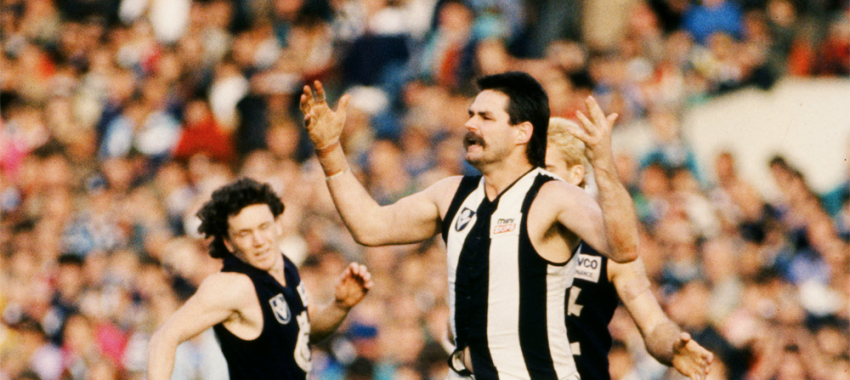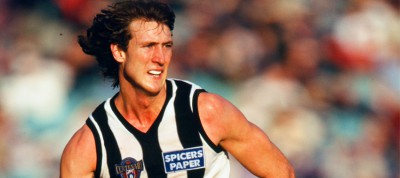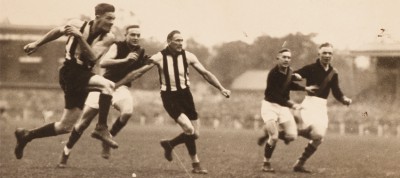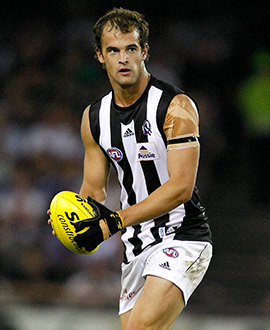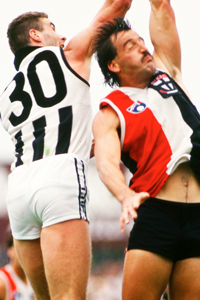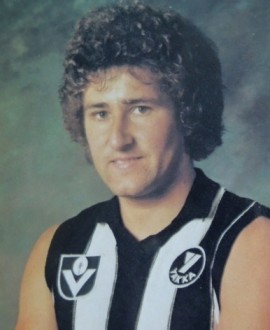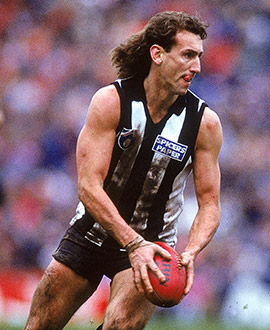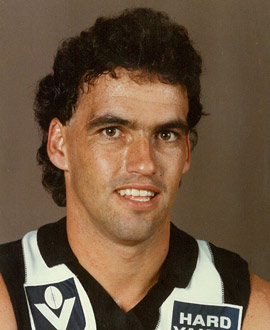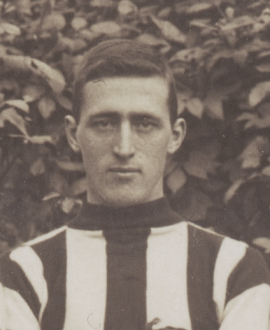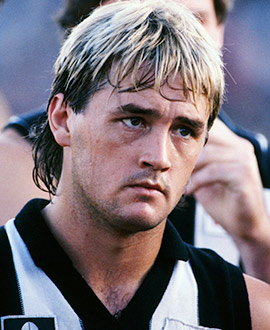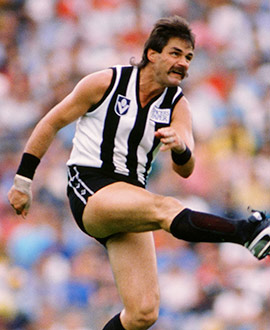The Magpies haven't always played the Bombers on April 25.
In fact, Collingwood has played on 11 other occasions on that date - one before it became a part of the Australian psyche and another 10 times after an act of parliament in 1960 permitted sporting events on ANZAC Day.
Two of them came against long-time rivals, Carlton. And both of them proved cracking contests.
The first happened over 100 years ago. It ended in a drawn match. One of the defenders from that game, Collingwood's Alan Cordner, would be dead a year later, on the day of the Gallipoli landings.
Thereafter, for the next 45 years, ANZAC Day was deemed too sacred to host sporting contests, even when the date fell on a Saturday.
It wasn't until 1960 that the VFL was finally granted permission to play games on ANZAC Day, so long as the reverence of the moment was honoured and that the RSL benefitted from the day.
The now traditional April 25 match between Collingwood and Essendon is a relatively new phenomenon in that context.
It wasn't until 1995 that then Bombers coach Kevin Sheedy, then Magpies football manager Graeme Allan and the late Victorian RSL president Bruce Ruxton resolved to create what is now a modern-day treasure.
Before that, the Magpies played on Anzac Day against Geelong (1964 and 1970); St Kilda (1973); Fitzroy (1974); Richmond (1977); Melbourne (1981 and 1991); Carlton (1984); Footscray (1987) and Hawthorn (1992).
The second time the Pies and the Blues met on April 25 happened in 1984, and for a long time, it loomed as a possible draw as well.
For those who remember the April 25, 1984 game against the Blues on a wet day at Waverley Park, or those who have seen footage on YouTube, it came down to one kick at the end of the game.
Collingwood defender Peter McCormack had done a superb job in keeping Carlton's WA recruit Warren Ralph quiet for most of the afternoon.
Yet just before the final siren, the umpire deemed that McCormack had infringed on Ralph, playing only his fifth game in navy Blue, and the big crowd went into a hush.
He would take the kick from 15m out, with Collingwood five points in front.
A straight kick from Ralph would have levelled the scores between the two sides - which had been the same result 70 years to the day.
Leading into that 1984 clash, Collingwood was coming off two successive losses.
Carlton still had many of its premiership players from 1979, and '81-82, which meant they went into the game as clear favourites.
The Magpies had lost to Sydney four days earlier, when former hero Bill Picken returned to Victoria Park in Swans colours for the first time and helped his new team take away the points.
That narrow loss put the pressure back on Magpies coach John Cahill, who admitted he was under strain to gain some positive results following the club's unrelenting recruiting campaign over the previous 18 months.
Speaking after the loss to the Swans, Cahill admitted he was "bitterly disappointed" by the club's form.
"We have got to respond, there's no point sulking," he said.
"We've now got to the stage where the mental toughness of the players will be challenged. It's really a make or break game for us."
There were two blockbuster games set aside for Anzac Day, 1984.
Collingwood and Carlton attracted 68,802 fans to Waverley Park, while across town Richmond and Essendon drew a crowd of 55,141 to the MCG.
The good news for Cahill was that Peter Daicos was back for the match against the Blues following a two-week suspension.
Casting an eye at the Magpies' team from that day, it consisted of five players recruited from rival VFL clubs - David Cloke (Richmond), Geoff Raines (Richmond), Bruce Abernethy (North Melbourne), Shane Morwood (Sydney) and Jim McAllester (Essendon/Footscray).
McAllester might have been the odd one out. He was the least known and the cheapest buy of the five. The others had cost a small fortune in attaining.
There was drama even before a ball was kicked. The Blues lost key players Mark Maclure and Ken Hunter, while Collingwood's Graeme Allan - one of the men who would later dream up the Pies-Bombers ANZAC clash 11 years later - also pulled out of the team just before the game.
Carlton's 20 players had played a total of 1852 games whereas Collingwood fielded a side that had played 600 games fewer than their opponents.
Three Magpies had played five or fewer games.
Mark Beers, the son of 1958 premiership player Brian, was 18 and was playing his fifth game.
Neville Shaw, 19, was wearing the Black and White senior jumper for the third time (his brother Tony was playing his 110th game), while 23-year-old Queensland spearhead Dale Woodhall went into his fourth game, having kicked a VFL career-high seven goals against the Swans the previous week.
Carlton coach David Parkin reserved the great Bruce Doull for Woodhall, which was an interesting call for a player who had played only a handful of games.
Cahill knew the importance of the match, and the occasion, stressing to the players what this contest meant to all.
He called on America's Cup-winning skipper John Bertrand, to speak with the team on the day of the game. Bertrand, who had led the crew of Australia II to an unprecedented victory seven months earlier, wanted to stress the importance of team work and commitment.
The club prepared for the crucial game with Bertrand speaking for 15 minutes "about team and committing yourself for the team", according to the Sun's well-respected football writer Peter Simunovich.
The newspaper recorded: "(Bertrand) told the players how crewmen in his experience in the Olympics, and the America's Cup, bled for each other and helped each other."
As the Magpie players ran out, they had Bertrand's voice in their mind, as well as the stories of the Anzacs deep in their thoughts.
Underdogs they might have been, but Cahill felt as if they were ready to make a stamp on the season.
And that's what they did, as Collingwood gained a narrow advantage in the first half hour after two first-quarter goals to McAllester, and one to Mark Williams, who was uncharacteristically stationed in attack.
The difference at quarter-time was six points, with Carlton's first two goals coming from first-year player Wayne Blackwell in only his fourth game. McCormack had kept Ralph quiet, though the Blues forward did manage to sneak a goal home in the second term.
Tony Shaw did a superb job on Wayne Johnston, who normally reserved his best for Collingwood. Johnston's form was so concerning for the Blues that he went to the forward pocket, but still couldn't get warm.
Murray Browne was considered to be one of the best afield, with some superb run from half-back. And Daicos' return had seen him have 17 touches to half-time and 29 by the end of the match.
Carlton narrowed the gap in the second term, with three goals to two. Williams got his second for the Pies, while the busy Abernethy helped to keep his team in front by two points at the main change.
Rain fell throughout the match with the conditions difficult for both sides, but Collingwood was the side that was adapting better to the slippery ground.
The first nine minutes of the third term changed the focus of the match, with the Magpies stealing a bit of a break on the opposition. Three goals in that time frame to Collingwood pushed it out to a 20-point break, which "stunned the Blues", according to the Herald. But predictably Carlton fought back and trailed by only seven points at three-quarter-time.
It all led to a last term that was a dog-fight, with each team struggling for goals.
Incredibly, Williams had kicked five goals to the end of the game, which was a superb performance.
Twenty six minutes into the final term, the Magpies were still clawing onto the lead, but the defences were breaking. Blue Peter McConville almost nailed a late goal, but it was touched in the goal square by Ralph.
That left it, as Peter Landy declared, with "a goal the difference."
Typically, his co-caller, the great Lou Richards predicted “this could be a draw, Peter."
The kick-in from McCormack resulted in a stalemate before a ball-up saw Phil Maylin roost the ball long towards Ralph, who was in front of the Magpie defender.
Ever so slightly McCormack placed his hand near the back of his opponent, as Richards declared: "Oh, great mark to McCormack...is he paying it? He's not paying it...it's a free kick, it's going to go to Ralph, this could level the scores."
Landy added: "What a time to give a decision (like that)." Richards said: "He's hardly had a kick all day; McCormack has done a marvellous job.
The drama dawned on those in the crowd.
A straight kick from Ralph from a 45 degree angle, from about 15 metres out would have drawn the contest.
A miss would mean a Collingwood win.
As the Blues forward prepared to line up for his kick, at least nine Magpies manned the mark or the goal square.
Incredibly, several members of the crowd jumped the fence and tried to push their way past the security.
Landy guessed: "He's got it, I think" before Richards corrected him: "He's missed it."
Collingwood had won by five points and the delight and joy of the Magpies players was mirrored by the fans that streamed onto Waverley Park to join in on the celebrations.
"You would think they had won the premiership," Landy said, and it looked like it, too.
Incredibly, Cahill had not witnessed the most important kick in the match.
Superstitious, the coach couldn't bear to watch, and he was halfway up the players’ race, heading into the rooms when Ralph took his kick.
He didn't know the result until Craig Davis came up to him and threw his arms around him.
Cahill said the win could be the making of the Magpies.
He said: "I look 100 years old, I know that, but I have been so excited for the players and for the Collingwood supporters because they have been through a lot and it was a good win.
"I don't think we deserved to lose it in the final analysis. I know the last quarter was a slog, but I thought for most of the day our disposal was a lot better.
"And being ANZAC Day, we decided to make it a courage day, to do the hard things. I thought the discipline was exemplary, the commitment to chase, tackles and man up was as good as I have seen."
Typically, Shaw, when interviewed on Channel Seven, played down his role on Johnston.
"It is a pretty easy job tagging, because you are not really worried about the ball. You just concentrate and keep close to them,” he said.
"I'm just rapt for the boys, we played two bad games in a row and everyone was canning us. There's a bit of spirit around here which we haven't had for a while.”
Carlton coach David Parkin said his team only had itself to blame, not Ralph.
He said: "It was just desserts...I was resigned to losing the game a long time before that. If we had drawn the game, it would have been an injustice from Collingwood's point of view."
Ralph was crestfallen, shattered by the miskick that could so easily have drawn the ANZAC Day match.
"I didn't hear the siren," he said.
"As I was lining up for my kick, (teammate) Spiro Kourkoumelis said something about it being over, and then I saw some kids jump the fence.
"I thought the angle I was put on was a bit rich, but I was reasonably confident of kicking a goal. I don't think I have felt so much pressure before; I just forced myself to feel relaxed and concentrate as hard as possible.
"I told myself it was just another goal and when I kicked the ball and saw the goal umpire not move, I thought I had kicked it I was dismayed when he only put up one hand."
Collingwood fans were delighted. Beating Carlton any time was special. Doing it on ANZAC Day was extra special, and the Blues are unlikely to ever get the chance to square up on football's most sacred day.


